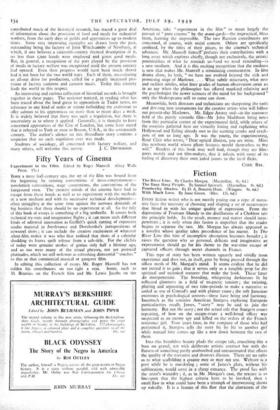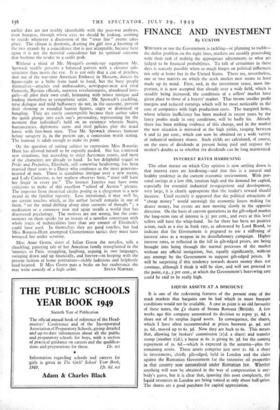Fiction
The River Line. By Charles Morgan. (Macmillan. 8s. 6d.)
EVERY fiction writer who is not merely paying out a rope of narra- tive faces the necessity of choosing and shaping a set of occurrences that blend in with his unique quality of expression. From the digressions of Tristram Shandy to the distillations of a Chckhov tale the principle holds. In the result, manner and matter should inter- penetrate ; it is only when this fusion is imperfect that the reader begins to separate the two. Mr. Morgan has always appeared as a novelist whose quality takes precedence of his matter. In The River Line this hint of incomplete absorption becomes broader ; it raises the question why so personal, delicate and imaginative art expressionist should go for his theme to the war-time escape of captured officers through secret channels in France.
This type of story has been written squarely and vividly from experience and does not, in itself, gain by being pressed through ihe silken mesh of Mr. Morgan's mind. It seems evident that he did not intend it to gain ; that it serves only as a tangible prop for the spiritual and technical textures that make the book. These' latter do interpenetrate. The brooding, whispering darknesses lit by reflected glimmers in a field of magnetic tension ; the twisting, plaiting and separating of two time-periods to make a narrative as coiled as one of Conrad's and with plainer cause; the soft Jamesian overtones in psychological stresses—these have being and harmony. Inasmuch as the sensitive American Sturgess exploring European particularities recalls James, " story " may be said to join the harmony. But not the story ; not the actual talc that Sturgess comes repeating, of how on the escape-route a well-loved officer was suspected as an enemy spy and killed on the orders of the French resistance girl. Four years later, in the company of those who had performed it, Sturgess tells the story bit by bit to another girl while mutual love comes up like a new dawn between the two of them.
Into this breathless beauty plods the escape tale, crunching .like a boot on gravel, not with deliberate artistic contrast but with the flatness of something partly unabsorbedand untransmuted that affects the quality of the narrative and destroys illusion. There arc no rules as to what scaffolding a creator may or may .not use. Webster is'a poet while he is murdering ; some of James's plots, without his sublimation, would serve in a cheap romance. The proof lies with the artist's wizardry ; if, as in .Mr. Morgan's case, the texture is so fine-spun that the highest criteria have to be invoked, then a small flaw in what could have been a triumph of interweaving shows up nakedly. It is a feature of this flaw that the characters of the
earlier date are not readily identifiable with the post-war analysts, even Sturgcss, through whose eyes we should be looking, seeming to recede whenever a discussion of the "river line" events takes place. The climax is dramatic, drawing the girl into a knotting of the two strands by a coincidence that is just acceptable, because here again it is not the material coincidence but its spiritual cutcome that beckons the reader to a sunlit peak.
Without a third of Mr. Morgan's cosmic-ray equipment Mr. Spcwack readily presents a balanced pattern with a cleverer sub- structure than meets the eye. It is not only that a can of peaches, shot out of the war-time American Embassy in Moscow, dances its figure-eight as a bribe from hand to hand, but the busy people themselves—attaches and ambassadors, newspaper-men and rival Generals, Russian officials, outworn revolutionaries, abandoned love- girls—all pilot their own craft, brimming with minor intrigue and lending themselves to sympathetic satire. Mr. Spcwack's crackling, terse dialogue and mild buffoonery do not, in the outcome, prevent their showing as rounded human figures, angry or dismayed or bungling. They are rarely contemptible because their author takes the quick plunge into each one's personality, representing for the moment that individual's hold on an existence wherein States, bureaucracies, diplomatic turns and rival policies play the usual havoc with free-born men. That Mr. Spcwack chooses humour before savagery is, in the present age, a concession worth noting. The humour is adult enough to make its point.
On the question of suiting subject to expression Miss Bonavia- Hunt has allowed herself to be expertly guided. She has contrived new situations, but according to strict Austenian tenets, and most of the characters are already to hand. In her delightful sequel to Pride and Prejudice, Elizabeth, still somewhat headstrong, has been married three years to a Darcy who continues as the most generous- hearted of men. There is scandalous intrigue over a new rector, and Lady Catherine, as her nephew observes here, "must still have her finger in every pie." The keenest Janeites may have some criticisms to make of this excellent "school of Austen" picture. The imposter from theatrical circles posing as a clergyman is a new strand in the familiar tapestry. Less intentional, it may well be, are certain touches which, as the author herself remarks in one of them, "set the mind drifting along alien currents of thought " ; a meditation or a comment now and again recalls a world that has discovered psychology. The motives are not wrong, but the com- mentary on them speaks for an instant of a novelist conversant with whole tracts of technicalities later than any creator of Elizabeth's could have used. In themselves they are good touches, but had Miss Bonavia-Hunt attempted Chattcrtonian tactics they must have betrayed her under scrutiny.
Miss Anne Green, sister of Julian Green the novelist, tells a chuckling, pattering tale of her American family transplanted in the 'nineties to Paris. struggling, laughing, arguing in two languages, swinging down and up financially, and forever—in keeping with the present fashion of home portraiture—richly ludicrous and helplessly kind-hearted. If Miss Green puts a brake on her exuberance she



































 Previous page
Previous page